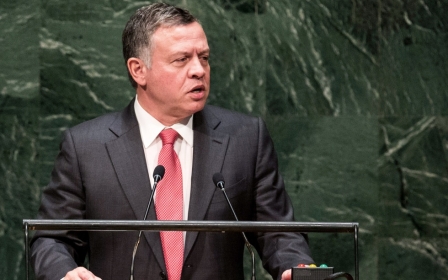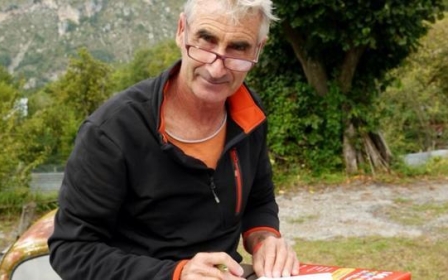US-led coalition strikes IS oil refineries in Syria

The US-led anti-IS coalition bombed Islamic State-controlled oil refineries in Syria on Wednesday as President Barack Obama recruited more allies to fight the militant "network of death."
US, Saudi and Emirati warplanes broadened their bombardment to target the oil installations in eastern Syria that have helped fund the military group's brutal rise from rebel faction to alleged global threat.
The strikes came as Obama urged leaders gathered at the UN General Assembly to join his coalition and convinced the Security Council to back a resolution to stem the flow of foreign fighters that has swelled the IS ranks.
Belgium and the Netherlands committed warplanes to Iraq and Britain said its parliament would vote Friday on potentially following suit.
"The United States of America will work with a broad coalition to dismantle this network of death," Obama told the UN referring to the Islamic State group, which has already taken control of vast swathes of land in Iraq and Syria.
"Today I ask the world to join in this effort."
Meanwhile, an IS-linked group in Algeria which had demanded France halt its participation in the strikes posted video footage of the execution of an abducted Frenchman.
"We will use our military might in a campaign of air strikes to roll back ISIL," Obama declared, using the acronym for the former Islamic State of Iraq and the Levant, since renamed the Islamic State.
Oil facilities pounded
Amid the overnight strikes targeting the oil refineries in Syria, 14 IS militants and five civilians were killed, a monitoring group said on Thursday.
The Syrian Observatory for Human Rights said the militants were killed in strikes in the eastern province of Deir Ezzor, and the civilians died in raids in northeastern Hasakeh.
While the strikes largely targeted oil facilities captured by the Islamic State group (IS), Observatory director Rami Abdel Rahman said at least one IS checkpoint was among the targets hit during the night.
Among the civilians killed in Hasakeh was a child, he added.
Overnight Tuesday to Wednesday, US air raids also targeted IS fighters threatening the Kurdish regional capital in Iraq and damaged eight militant vehicles operating in eastern Syria near the Iraqi border.
Then as night fell on Wednesday, Arab jets joined the US-led bombardment again as the target list was expanded to include economic assets.
The latest round of air raids focused on 12 targets in eastern Syria, where IS extremists control small-scale oil refineries.
"These 12 targets were what we call modular oil refineries," Pentagon spokesman Rear Admiral John Kirby told CNN.
"They were struck with precision-guided missiles by coalition aircraft. In fact, there were more coalition aircraft in the skies on these particular missions than US (planes)," he said.
Alongside US aviation and cruise missiles, Saudi Arabia, Bahrain, the United Arab Emirates and Jordan have hit targets in Syria, and France in Iraq. Qatar is providing logistical support.
At the United Nations, Obama and French President Francois Hollande led international condemnation of the murder of the French hiker, 55-year-old Herve Gourdel, by the IS-linked Jund al-Khilifa.
Hollande vows no let-up
Paris opposed the 2003 US-led invasion of Iraq but has sent Rafale fighters into action over Iraq - but not to the parallel campaign in Syria - and Hollande vowed not to give in to the IS group.
"The fight against terrorism must continue and be stepped up," Hollande said.
IS militants in Syria had already killed two American journalists and a British aid worker, but Gourdel's death was the first at the hands of an allied group outside the core area since the US campaign began in early August.
Obama said the United States stood with France and chaired a UN Security Council meeting which unanimously adopted a binding resolution to turn back the flow of foreign fighters heading to Iraq and Syria.
It requires all countries to adopt laws that would make it a serious crime for their nationals to join jihadist groups such as Islamic State and Al-Nusra Front, or risk economic sanctions or military action.
Jordan's King Abdullah II, whose country is sheltering nearly 1.4 million Syrians, told the UN General Assembly there had to be a collective strategy to defeat militants who threaten global security.
In their capitals, Belgium and the Netherlands said they would each send six F-16 fighter bombers to join the air campaign in Iraq.
Apart from the F-16s, the Netherlands will also deploy 250 military personnel and 130 trainers for the Iraqi military, which was overrun by IS militants in a brutal campaign of beheadings and forced religious conversions.
The Belgian parliament must still approve the move, which follows a formal request from Washington on Tuesday.
Iran 'could help'
On the sidelines of the assembly, Prime Minister David Cameron said the British parliament would hold an extraordinary session on Friday to vote joining the strikes, as requested by Baghdad.
Cameron meanwhile declared Iran could be "part of the solution" in defeating IS militants after landmark talks with Iranian President Hassan Rouhani.
"Iran's leaders could help in defeating the threat from ISIL," Cameron said.
"They could help secure a more stable, inclusive Iraq, and a more stable, inclusive Syria. And if they are prepared to do this, then we should welcome their engagement."
Rouhani meanwhile reiterated his scepticism that air strikes alone could successfully defeat "extremely savage and barbaric" militants in the region.
"It is not clear for us what they are seeking," he said in an interview with US broadcaster Charlie Rose when quizzed about US motives in the air campaign.
"But what I can tell you unequivocally, no terrorist group can be eradicated and destroyed through aerial bombardments only."
New MEE newsletter: Jerusalem Dispatch
Sign up to get the latest insights and analysis on Israel-Palestine, alongside Turkey Unpacked and other MEE newsletters
Middle East Eye delivers independent and unrivalled coverage and analysis of the Middle East, North Africa and beyond. To learn more about republishing this content and the associated fees, please fill out this form. More about MEE can be found here.




